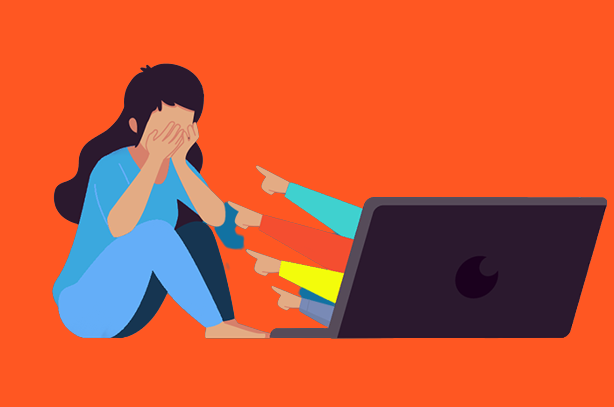
This Article is written by Rohan Kumar student of BBA LL.B from Geeta Institute of Law, Panipat (Haryana)
Abstract:
Internet culture has become an important part of human life. While enjoying the internet, various social media platforms and information sharing like Text, Photos, Videos, Passwords, Bank details (Credit card or Debit card) and any other personal information on social media, yet it requires a great believe and expectation that the data we are sharing on internet is totally safe and private and the users believe that there will be no breach of their privacy over the internet pertaining to e- commerce companies in the era of transformative marketing. But, in many cases it is observed that Hackers around the world steal the user’s data and sell it in the Global market and sometimes they use it to Blackmail the Data owner in order to extract money from them. “Revenge porn” is one of the new emerging trends in this internet culture.
Furthermore, this research article addresses the concern of Privacy and Security over the internet and this article will also discuss about the Private data and Public data of the users, along with this The Article will also provide an important observation about one more emerging social crime which is very common in present era that is “Revenge Porn”. In simple language it is a threat or Blackmail to the user for leaking his/her personal photos or videos having sexual content related to the user for malicious purpose.
Keyword- Internet data, Private data, Blackmail, Revenge porn, Privacy & Security
Introduction:
Privacy over the internet is crucial in today’s world because the internet has become an integral part of our lives. With the advancement of technology, more and more personal data is being collected, processed, and shared online. While this has made life more convenient, it has also given rise to several privacy concerns.
The importance of privacy over the internet lies in the fact that personal information is being shared with various organizations and individuals. This information can include names, addresses, phone numbers, email addresses, credit card information, private photos or videos and more. If this information falls into the wrong hands, it can be misused for identity theft, fraud, extortion of money and other malicious purposes.
Moreover, the internet is also used for communication, and people share their thoughts, feelings, personal life issues or moments and opinions online with their friends, relative or someone they know. Without privacy and security, individuals may hesitate to express themselves freely, fearing backlash, discrimination, or other negative consequences.
Another crucial aspect is that internet users must have control over their personal information. They should have the right to decide what information they want to share, with whom, and for what purposes. Privacy laws and regulations play a crucial role in ensuring that users’ rights are protected and that their personal data is not misused.
In summary, the importance of privacy over the internet cannot be overstated. It is essential to safeguard personal data, protect individual freedom of expression, and ensure that users have control over their personal information and data.
Two types of Data:
• Private Data
• Public Data
Definition & Intro:
Private data-
As it is very cleared from its name that a Private data is a data which is personal in nature and it contains essential information of the user, it can be in any form weather it is photo, video or text.
Why is Privacy of Private or Personal Data Important?
The information we share online can reveal a lot about us, including our identity, location, financial information, and personal interests. If this information falls into the wrong hands, it can be used to steal our identity, commit fraud, or carry out other malicious activities. Moreover, privacy is a fundamental human right, and our personal data should be protected and there should be no breach of Right to privacy.
How our Private or personal data can be collected in a variety of ways, including:
• Cookies: These are small files that websites store on our computer to track our browsing habits.
• Social media: Social media platforms collect data on our activities, interests, and interactions.
• Online forms: When we fill out online forms, we often provide personal information such as our name, email address, and phone number.
• Public records: Some personal information such as our address, date of birth, and occupation are available through public records.
• Online transactions: When we make online purchases or conduct online banking, our financial information is collected and stored.
• Third party applications: While using any website on internet sometimes it refers us to the other third party website and which ask our personal information.
Measures that can be taken to protect private or personal data online from Fraud or misconduct:
• Use strong passwords: A strong password is the first line of defense against hackers. A good password should be at least 12 characters long, include uppercase and lowercase letters, numbers, and symbols.
• Enable two-factor authentication: Two-factor authentication adds an extra layer of security by requiring a second form of verification, such as a code sent to your phone.
• Use a VPN: A virtual private network (VPN) encrypts your internet traffic, making it harder for hackers to intercept your data.
• Keep software up-to-date: Keep your software, including your browser, operating system, and anti-virus, up-to-date to ensure that security vulnerabilities are patched.
• Limit personal information online: Be cautious about sharing personal information online, especially on social media. Think twice before sharing your location, date of birth, or other sensitive information.
From the above information, it is well cleared that the user must take some precautionary steps to save himself/herself from the Hackers to keep their privacy constant and must take all the primary safeguards to keep our data private.
Public Data:
Definition & Introduction:
As it is very clear from the name that “Public Data” is the form of data which is Public that is easily available. The accessibility of public data over the internet raises concerns about privacy. Even though this data is meant to be freely available, it can still contain personal information that can be misused if it falls into the wrong hands. Now, we will discuss the privacy concerns associated with public data over the internet, and ways to protect privacy
One of the most significant concerns with public data over the internet is that it can be used for identity theft. Personal information such as your name, address, phone number, and email address are easily available through public data. This information can be used by cybercriminals to steal your identity and carry out fraudulent activities in your name.
Another concern is that public data over the internet can be used to track your online activities. For example, if you visit a government website, the website may collect information about your browsing habits, such as the pages you visit, the time you spend on each page and the links you click on. This information can be used to create a profile of your online activities, which can be sold to advertisers or used for other purposes.
In conclusion, public data over the internet can be a valuable resource, but it also raises concerns about privacy. It is essential to be cautious about the information you share online and take steps to protect your privacy. By following the tips mentioned above, you can safely access public data over the internet without compromising your privacy.
• Blackmailing Revenge Porn
Introduction :
Blackmailing and revenge porn are two forms of cybercrime that can have serious consequences for the victims involved. When someone shares intimate or sexually explicit images or videos of another person without their consent, it is known as revenge porn.
Blackmailing, on the other hand, is when someone threatens to reveal sensitive information about someone else unless they agree with their demands.
Blackmailing revenge porn occurs when someone threatens to share intimate or sexually explicit material of another person unless they comply with their demands. The demands can vary, but often involve money, sexual favors, or other forms of coercion. The perpetrator may have obtained the material through hacking, theft, or by coercing the victim into sharing it.
The impact of blackmailing revenge porn on the victim can be dangerous both physically or mentally. They may experience anxiety, depression, humiliation, and damage to their reputation. It can also lead to job loss, relationship breakdowns, and even suicide.
The term revenge porn means uploading someone’s personal photos or videos on digital platforms to humiliate them socially. When the relationship turns hostile, either partners uses the recorded material to threaten and blackmail the person by sharing the pictures and videos out in public or with family and friends.
As Blackmailing is becoming a very common offence in India and it is increasing day by day. Commonly, it is used to extort money from the victim and if the prey somehow fails to agree to their demands then these blackmailers threats the victim to leak his/her personal data that can be any like; text, photo, video or they could even threats to share any sexual or private data of the victim.
As it is a very common in Indian, Women, Men & Children who are minor also become targets of such Blackmail trap. A number of male and female commit suicide each year in the fear of losing their reputation and respect in the society by these revenge porn.
Hackers generally tracks the user data and access into the private chats or any other Folder that contains the Private photo, video of the user and if they find something that contains any kind of sexual content of the victim they use it as a tool to extort money from the victim by threatening him/her that if they will not fulfill the demand of hackers they will leak their all private data.
Furthermore, here the interesting thing is that in many cases it is seen that not the hackers but our known who can be a friend, a relative, our partner or someone we know they also blackmails us in order to get any benefit or favor and in the fear of saving our reputation and respect in the society we have to agree with them.
If we compare the ratio of Boys and Girls that fell in the trap of this Revenge porn then the Girls are more likely to fall in this trap and interestingly most of the time they are blackmailed by their partner, it can be their lover or husband and by their own male friends.
To prevent blackmailing, a person should not post any of his/her private information on social media platforms, which is easily accessible. Never share your passwords with anyone. Never respond to negative posts. Block any user that sends you sexual content on social media sites and directly seek help from the Police and law.
Case law:
State of West Bengal VS Animesh boxi (C.R.M. No. 11806 of 2017, GR/1587/2017).
This case was given a landmark judgment on revenge porn in March 2018, west Bengal. The 23 years old was in a relationship with the 20 years old girl victim. On the promise of marriage, by doing fraud he got private and intimate pictures of the victim. When the victim called off the marriage the accused uploaded her photographs on a porn site and blackmailed her into getting back into the relationship. The court sentenced the man to 5 years of imprisonment with a fine of Rs.9000. The accused was charged by the court under sections 354,354, 354C, and 509 of the Indian Penal Code 1860. Further, he was charged under sections 66C, 66E, 67, and 67A of the information technology Act.
The court ordered for the 20 years old victim girl that she should be treated as a rape survivor and ordered to provide appropriate compensation to her.
Conclusion:
Privacy in data over the internet is crucial for protecting individuals from various types of harm, including blackmailing and revenge porn. With the increasing use of technology and the internet, personal data is constantly being collected, stored, and shared by various entities, often without individuals’ knowledge or consent. This makes individuals vulnerable to various forms of abuse, including blackmailing and revenge porn.
To protect oneself from such harms, individuals should take measures to protect their privacy, such as using strong passwords, enabling two-factor authentication, avoiding sharing personal information online, and being cautious about the websites and apps they use.
Government must protect the reputation and privacy of the victim.
The victim of cybercrime can register their complaint on www.cybercrime.gov.in
A victim can also register an F.I.R at the nearest police station.





0 Comments